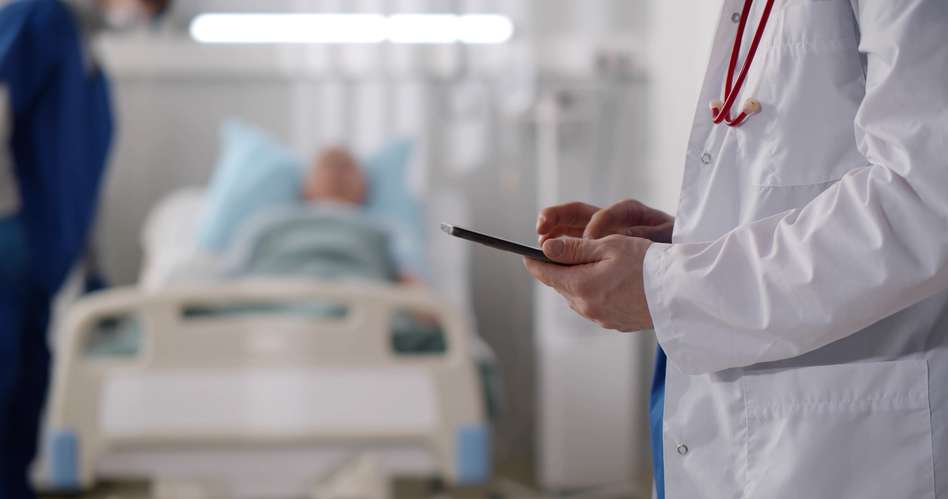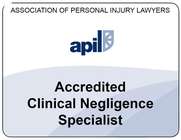medical negligence
When medical negligence becomes criminal

Medical negligence arises when the treatment provided by a healthcare professional falls below the standard of a responsible body of medical opinion and that substandard care has caused harm or injury.
In some cases, however, a doctor’s actions go so far beyond what is considered acceptable that their behaviour is deemed to be criminal.
Our medical negligence specialists provide expert legal advice for a wide range of medical negligence claims.
If you think the medical treatment that you have received has been negligent or even criminal, Tees can help you to recover compensation for the harm that you have suffered.
Call our medical negligence solicitors for a FREE initial consultation on 0800 013 1165
Deliberate negligent acts resulting in criminal conviction
In rare cases, doctors treat their patients in ways that go far beyond medical negligence. In these circumstances, their actions can only be treated as a deliberate attack on their patients.
In 1993, Beverley Allitt, known as the “Angel of Death” was given 13 life sentences after being convicted of murdering four children and in 2000, Harold Shipman was found guilty of murdering 15 of his patients and is thought to have had over 200 victims.
A recent example is the case of surgeon Ian Paterson.
What did Ian Paterson Do?
Ian Paterson was convicted of 17 counts of wounding with intent in April 2017 and is currently serving a 20 year prison sentence. Paterson had performed unnecessary surgeries on over 1,000 patients in the Heart of England NHS and private hospitals (Spire Parkway and Spire Little Aston). These procedures included hernia surgeries, varicocele repairs, unnecessary mastectomies leaving his victims feeling violated, mutilated and psychologically traumatised. He also performed unregulated "cleavage-sparing" mastectomy procedures, leaving breast tissue that often resulted in the return of the cancer and, in some cases, the death of the patients.
In February 2020 a report from an Independent Inquiry was published.
It is estimated that Paterson treated more than 11,000 patients. Of these, more than 750 have so far received compensation for the damage he caused to them in a settlement deal struck in 2017, involving some 40 law firms. However, many more may have been affected by his actions and that they too may be due compensation.
In December 2020, more than 5,000 patients were contacted by Spire Healthcare after independent clinicians reviewed their medical records. Patients were offered a telephone meeting and follow-up treatment, and Spire Healthcare have set up a new compensation fund for victims of Ian Paterson. Tees is pleased to help former patients of Mr Paterson who have been recalled by the Spire to claim compensation from the second compensation fund, if they did not apply for compensation from the initial fund for the same injury.
Failing to provide safe care and treatment
In April 2021, East Kent Hospitals NHS Trust pleaded guilty to a criminal charge brought by the Care Quality Commission (the CQC) over failings that led to the death of Harry Richford, at 7 days of age. Harry was delivered by emergency caesarean section performed too late by a locum, a second doctor delayed resuscitating Harry and he died from irreversible brain damage.
The CQC charged the Trust with breach of regulation 12 of the Health and Social Care Act 2008 (Regulated Activities) Regulations 2014, which obliges trusts to provide safe care and treatment.
Again in July 2021, The Independent reported that the CQC is considering a criminal prosecution against Nottingham University Hospitals Trust, following the death of baby Wynter Andrews in September 2019.
When does a lack of consent give rise to a criminal case of battery or assault
If a patient has not given informed consent to a medical procedure both medical negligence and criminal liability may arise.
Informed consent is a relatively complex legal concept, but the over-riding principle is that a patient has the right to be advised of not only the benefits but also the material risks of the proposed treatment and be made aware of any reasonable alternatives (including doing nothing). Consent issues normally arise in the context of surgery but should be considered when any treatment is offered.
If a patient has not consented to the medical treatment, this could lead to a criminal charge for battery or assault. This requirement for consent is waived if the patient:
- is unconscious or incapacitated and needs emergency life-saving treatment
- needs an additional emergency procedure during an operation
- lacks capacity to consent to treatment of their mental health due to their mental health condition (but consent is still required for treatment for unrelated physical conditions)
- has been detained under the Mental health act
- is a public health risk due to having Rabies, Cholera or TB
Once more, it is the Police and Crown Prosecution Service that determine whether it is appropriate to bring a criminal case against a doctor in these circumstances. Intent to harm is likely to be very relevant and more often than not a civil suit will be more appropriate.
Criminal gross negligence (medical) manslaughter
The crime of gross negligence (medical) manslaughter arises where death occurs as the result of “truly, exceptionally bad” healthcare.
Usually a criminal investigation is triggered by the Coroner referring the case to the Police for investigation, although families can also ask the Police to look at the circumstances of death. The CPS will consider whether it is in the public interest to prosecute the relevant medical professional including whether they consider that prosecution is a proportionate response. The case will be decided by a Jury, in a criminal court. To secure a conviction, the Jury must be satisfied, beyond all reasonable doubt, that the individual or Trust committed the crime of gross negligence manslaughter. A conviction may result in a custodial prison sentence.
How do you prove gross negligence manslaughter?
In 1994, an anaesthetist called Adomako was convicted of gross negligence manslaughter. Adomako hadn’t noticed that a patient’s oxygen pipe had become disconnected during an operation. Consequently, the patient died.
The judge in this case set out the test for gross negligence manslaughter:
- there must be a duty of care
- the defendant must have breached that duty of care
- the breach must have caused the death of the victim and
- the breach of duty is so serious in all the circumstances that it should be judged criminal
The judge also gave some examples of what might constitute a criminally serious breach:
- indifference to an obvious risk of injury to health
- knowing the risk of injury to health at the outset but a determination to run the risk nevertheless
- knowing the risk of injury to health and intending to avoid it but coupled with such a high degree of negligence in attempting to avoid injury that a jury deems a charge of criminally serious breach as necessary
Gross negligence manslaughter conviction examples
- in 2007 Dr Stevenson, a GP, who injected his patient with six times the required dose of diamorphine for a migraine, admitted manslaughter but was spared jail
- in 2015 Dr Bawa Garba a trainee doctor, was found guilty of gross negligence manslaughter when she failed to diagnose and treat sepsis leading to the death of a 6-year-old boy, Jack Adcock
- however in 2016, a Boots optometrist, Honey Rose who had missed signs of a lethal build-up of fluid on 8-year-old Vincent Barker’s brain, which tragically resulted in the his death, had a conviction for manslaughter overturned.
In this final example, the judge stated that: for gross negligence to be found, there must be a “serious and obvious risk of death”, rather than just risk of serious injury. The risk must be “assessed with respect to knowledge at the time of the breach of duty”.
The line between negligence and gross negligence is therefore still hard to define.
Corporate manslaughter and corporate homicide
The Corporate Manslaughter and Corporate Homicide Act 2007 means that organisations can be found guilty of the office of corporate manslaughter or homicide.
In a medical context, NHS Trusts may face criminal prosecutions if a patient dies as a result of gross negligence. If found guilty, the healthcare Trust may be fined or ordered to take steps to remedy any deficiencies in health and safety policies, systems or practices.
A series of baby deaths at the East Kent Hopsitals University Trust has recently prompted a police investigation into a possible corporate manslaughter and/or gross negligence manslaughter charge relating to unsafe maternity care that has affected nearly 200 families over a number of years. The Health and Social Care Committee on maternity safety in England has now released a report on the Safety of Maternity Services in England. The report concludes that improvements in maternity services have been too slow, with the CQC’s Chief Inspector of Hospitals reporting evidence of a ‘defensive culture’, ‘dysfunctional teams’ and ’safety lessons not learned’. Sound familiar? MPS have recommended urgent action to address staffing shortfalls in maternity services with staffing numbers identified as the first and foremost essential building block in providing safe care.
How Tees can help
If you or a close family member have suffered harm from negligent medical treatment, please get in touch. We will investigate what happened, advise you on your potential claim, and support you in bringing a claim.
We know that going through something like this alone can be a daunting and worrisome prospect, but our empathetic and caring team is here to help you secure the best outcome.
Call for a FREE initial consultation on 0800 013 1165
Tees is here to help
We have many specialist lawyers who are based in:
Cambridgeshire: Cambridge
Essex: Brentwood, Chelmsford, and Saffron Walden
Hertfordshire: Bishop's Stortford and Royston
But we can help you wherever you are in England and Wales.
Chat to the Author, Janine Collier
Executive Partner, Medical Negligence, Cambridge office
Meet Janine
- Areas of expertise
- Accreditations
- Testimonials
Legal 500 UK 2023
'Janine Collier has an amazing reputation and quite rightly, she very quickly spotted something that wasn’t the main focus of the case but is able to zoom out and look at everything that’s going on and spot things others wouldn’t spot. You can tell she really cares and is a very dedicated person who just wants to help. The team are all caring and efficient'
A
Cambridge
'A heartfelt thank you for all you have done in preparation for and during the settlement meeting, as well as for your unfailing support along the way, in and out of hours. It is undoubtedly due to your high professionalism if the outcome today has exceeded all expectations; it will be a huge help for us going forward and we will be forever grateful'
Chambers & Partners 2022
Cambridge
'Janine Collier is renowned for her handling of delay in diagnosis, obstetric injury and surgical negligence claims. She is at the top of her game and knows clinical negligence inside and out'
Susan Hickman
Cambridge
'We consider ourselves fortunate to have been recommended to Tees by the solicitor we initially approached. We did not realise it until the case was well established that the level of professional care we were receiving was exceptional and that the experience of the individuals and the contacts they have to assist in a very complex case was the best available. We are grateful that we received a satisfactory settlement as a result of their efforts under difficult circumstances and dealing with defendants that were obstructive and disorganised. By far the greatest benefit for us however is the fact that the victim, with assistance from highly skilled experts that we would not have known about otherwise, learned to walk short distances when all other medical opinion did not consider this possible. This was their greatest achievement which is well beyond the service we expected'
Legal 500 UK 2021
"Janine Collier, head of department, is a perspicacious and very able lawyer, certainly one of the best in the region and beyond, who believes in her team and in the work she does. A genuinely nice person who sees it as her clients’ right and her duty to achieve the best possible outcome for them. Janine delivers this time after time. She is an extremely intelligent and intuitive lawyer who has a genuine understanding of the difficulties and fears clients experience when living with an avoidable injury."
Legal 500 UK 2021
"Janine Collier is a really good solicitor – she really understands the medicine in clin neg cases and works well with the team, the clients and the experts to get excellent results in difficult cases."
Legal 500 UK 2021
"Janine Collier is exceptionally good at analysis, organisation and strategy."
Legal 500 UK 2021
"Janine Collier is a really good solicitor, she really understands the medicine in clinical negligence cases and works well with the team, the clients and the experts to get excellent results in difficult cases."
Legal 500 2021
"Janine Collier shows dedication to ensuring access to the highest level of experts on medical negligence cases. There is excellent consistent communication with experts throughout a lengthy case, creating a supportive working atmosphere and ensuring long-term engagement of expert. She has a very intelligent and insightful approach to learning from experts, enabling sharing of detailed specialist information and findings with confidence, and she is excellent in multi-professional meetings with solicitors and barristers, enhancing communication in exceptionally complex cases; very high level of sensitivity demonstrated towards the needs of client throughout the case, consistently focusing on the multifactorial needs of the client, over and above the monetary compensation."
Legal 500 UK 2021
"Janine Collier has been amazing to work with. She is always quick to respond to queries, always takes time to make sure we fully understand the process and supports us to make decisions, i.e. switching from Legal Aid to no-win no-fee, with well reasoned and researched information to support us."
Legal 500 UK 2021
‘It has always been a rewarding experience working with Janine Collier and I would commend her very highly to lead on medical negligence cases.‘
The Fisher family
Janine works with empathy, understanding and compassion. She handled our mother's inquest with skill and sensitivity and guided us expertly. She kept us informed continually via email and multiple meetings and phone calls. Janine completely took the sting and the stress out of our case.






